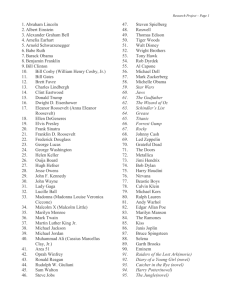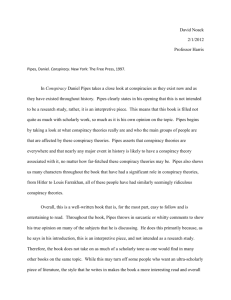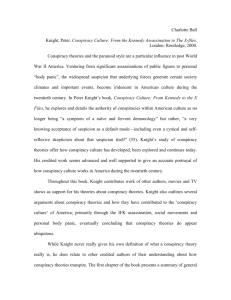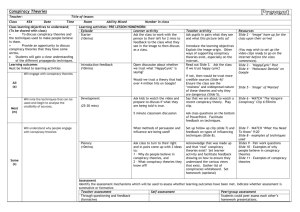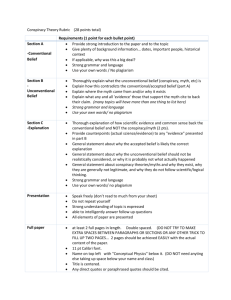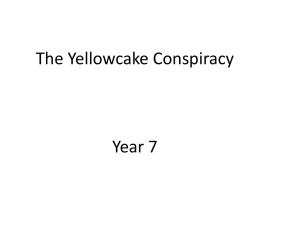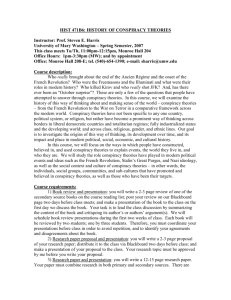HIST 471B6 — History of Conspiracy Theories
advertisement
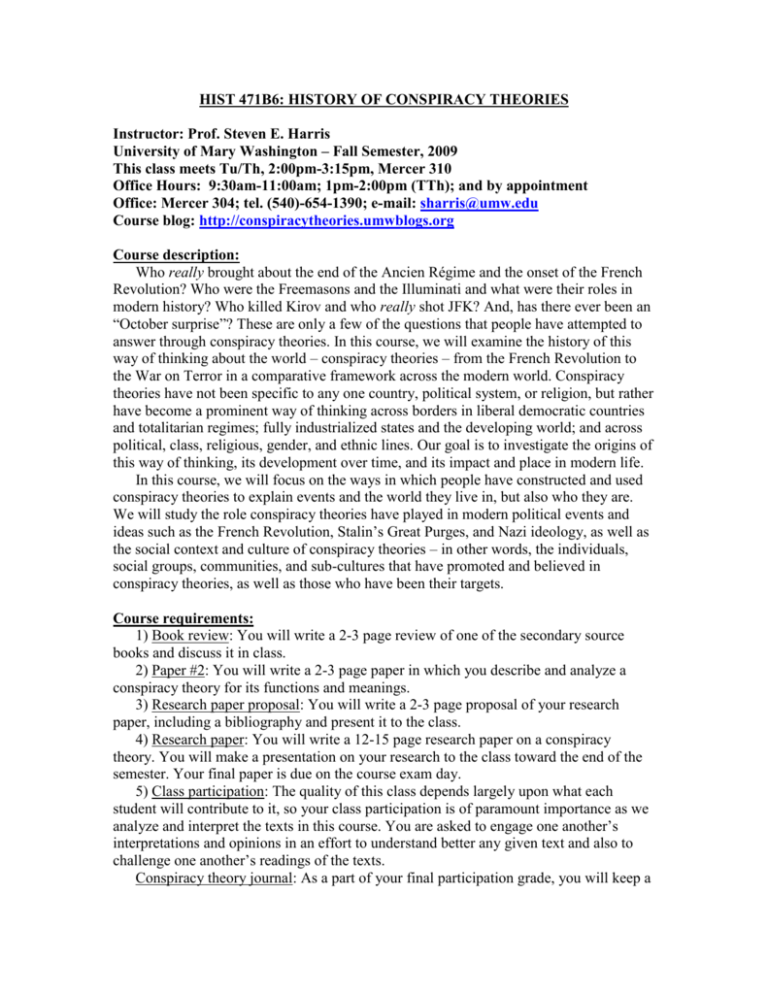
HIST 471B6: HISTORY OF CONSPIRACY THEORIES Instructor: Prof. Steven E. Harris University of Mary Washington – Fall Semester, 2009 This class meets Tu/Th, 2:00pm-3:15pm, Mercer 310 Office Hours: 9:30am-11:00am; 1pm-2:00pm (TTh); and by appointment Office: Mercer 304; tel. (540)-654-1390; e-mail: sharris@umw.edu Course blog: http://conspiracytheories.umwblogs.org Course description: Who really brought about the end of the Ancien Régime and the onset of the French Revolution? Who were the Freemasons and the Illuminati and what were their roles in modern history? Who killed Kirov and who really shot JFK? And, has there ever been an “October surprise”? These are only a few of the questions that people have attempted to answer through conspiracy theories. In this course, we will examine the history of this way of thinking about the world – conspiracy theories – from the French Revolution to the War on Terror in a comparative framework across the modern world. Conspiracy theories have not been specific to any one country, political system, or religion, but rather have become a prominent way of thinking across borders in liberal democratic countries and totalitarian regimes; fully industrialized states and the developing world; and across political, class, religious, gender, and ethnic lines. Our goal is to investigate the origins of this way of thinking, its development over time, and its impact and place in modern life. In this course, we will focus on the ways in which people have constructed and used conspiracy theories to explain events and the world they live in, but also who they are. We will study the role conspiracy theories have played in modern political events and ideas such as the French Revolution, Stalin’s Great Purges, and Nazi ideology, as well as the social context and culture of conspiracy theories – in other words, the individuals, social groups, communities, and sub-cultures that have promoted and believed in conspiracy theories, as well as those who have been their targets. Course requirements: 1) Book review: You will write a 2-3 page review of one of the secondary source books and discuss it in class. 2) Paper #2: You will write a 2-3 page paper in which you describe and analyze a conspiracy theory for its functions and meanings. 3) Research paper proposal: You will write a 2-3 page proposal of your research paper, including a bibliography and present it to the class. 4) Research paper: You will write a 12-15 page research paper on a conspiracy theory. You will make a presentation on your research to the class toward the end of the semester. Your final paper is due on the course exam day. 5) Class participation: The quality of this class depends largely upon what each student will contribute to it, so your class participation is of paramount importance as we analyze and interpret the texts in this course. You are asked to engage one another’s interpretations and opinions in an effort to understand better any given text and also to challenge one another’s readings of the texts. Conspiracy theory journal: As a part of your final participation grade, you will keep a weekly journal on the conspiracy theories and conspiracy culture you encounter outside of the classroom in your everyday lives. We will start the first few minutes of each class period with a review of one or two students’ journal entries. Over the course of the semester, you are expected to contribute to this part of the class at least twice. The following is the guideline for participation grades: A range (90-100%): student participates daily, shows that he/she reads all of the assigned readings, makes several comments and poses questions that are insightful and help guide discussion; B range (8089%): student participates regularly, shows that he/she reads most of the readings, makes some comments/questions; C range (70-79%): student participates on occasion, may read some of the readings, makes little or no comments; D range (60-69%): student rarely participates and/or is disruptive in class; F (0%): student never participates once in class. If you miss class without an excused absence on the day your peers are scheduled to do in-class presentations, your final participation grade will be lowered by a full letter grade. Numerical grades in this course correspond to the following letter grades: A (95-100); A- (90-94); B+ (87-89); B (83-86); B- (80-82); C+ (77-79); C (73-76); C- (70-72); D+ (67-69); D (60-66); F (59 and below). When computing final numerical grades, I do not round up to the highest decimal point (i.e., if your final numerical grade is an 82.99, your final grade is a B-). Midterm Deficiency Report: You will receive a midterm deficiency report if you receive a C- or below on your participation grade to date or your writing assignments to date (for all of you, this includes your paper proposal and presentation; for some of you, this will also include your book review and presentation). Course grades: Class participation: Book review: Paper #2: Research paper proposal: Research paper: 25% 10% 10% 15% 40% Legitimate Excuses for Missing Class and Turning Work in Late: Legitimate excuses include family emergencies, medical appointments, illness, religious holidays, and trips related to official student activities. Athletic practices never constitute a legitimate excuse for missing class. All excuses must be supported with documentary proof, such as a note from a doctor, with the contact information of the person writing the excuse. In the event of a family emergency, such as a death in the family, contact the Office of Academic Affairs and ask them to contact me about the emergency. If you miss class or fail to turn something in on time and you have a legitimate excuse, do the following: give me the documentary proof explaining your absence or the reasons for which you turned something in late; stop by during office hours to discuss what you missed in class. Unless warranted by a legitimate excuse as defined above, there will be no extensions on the assignments in this course. 2 If you miss class or fail to turn something in on time without a legitimate excuse, do not e-mail me to tell me this and do not ask me to explain to you over e-mail what you missed in class; I will not respond to such e-mails. For every day after a deadline that you turn work in late without a legitimate excuse, your grade on the assignment is dropped by a full letter grade until you reach an F (0%) on the assignment. Failure to complete any of the writing assignments by the exam day (even though you will receive a 0% on them) will result in an automatic F for the course. Communication: Use e-mail to communicate with me about minor questions and administrative questions. Use formal forms of address, salutations, and good-byes, as well as proper spelling, grammar and punctuation, when writing e-mails to me. To discuss readings and course topics, questions about writing assignments, etc., stop by during office hours. Honor Code: The Honor Code of the University of Mary Washington will be strictly enforced, as explained in the Honor Constitution. All violations of the Honor Code (e.g., plagiarism on papers) will be immediately reported to the Honor Council. Americans with Disabilities Act: If you have a disability and require academic accommodation, contact the Office of Disability Services (x1266). Upon obtaining an accommodation letter from this office, see me to establish the academic accommodation for you in this course. All information pertaining to your academic accommodation will be kept in the strictest confidence. Additional Class Policies: * Electronic equipment such as cell phones must be turned completely off during class. * Out of respect for your peers and your instructor, arrive to class on time. You must attend the entire class time in order to receive credit for participation for that day. * This syllabus is subject to change exclusively at my discretion. Course blog: * The course’s main blog is at http://conspiracytheories.umwblogs.org. It includes a copy of the syllabus, instructions for writing assignments, and other course materials. Course readings: Required readings available at the UMW bookstore: Brent, Jonathan and Vladimir P. Naumov. Stalin’s Last Crime: The Plot Against the Jewish Doctors, 1948-1953. New York: HarperCollins, 2003. DeDillo, Don. Libra. New York: Viking, 1988. Lipstadt, Deborah E. Denying the Holocaust: The Growing Assault on Truth and Memory. London: Penguin, 1994. Knight, Peter. Conspiracy Culture: From the Kennedy Assassination to the X-Files. London and New York: Routledge, 2000. Pipes, Daniel. Conspiracy: How the Paranoid Style Flourishes and Where It Comes From. New York: The Free Press, 1997. 3 West, Harry G. and Todd Sanders, eds. Transparency and Conspiracy: Ethnographies of Suspicion in the New World Order. Durham: Duke University Press, 2003. Course schedule: August 25: Introduction: Thinking historically about conspiracy theories August 27: Foundations of a Historical Paradigm * Richard Hofstadter, “The Paranoid Style in American Politics” (Course blog) The French Revolution: Crucible of Modern Conspiracy Theories September 1: * Amos Hofman, “Opinion, Illusion, and the Illusion of Opinion” (Course blog) September 3: * Timothy Tackett, “Conspiracy Obsession in a Time of Revolution” (Course blog) * The Law of Suspects (Course blog) * The Conspiracy of Equals (Course blog) Anti-Semitism and Holocaust Denial September 8: * Lipstadt, Denying the Holocaust, 1-182. September 10: * Lipstadt, Denying the Holocaust, 183-235. September 15: * Protocols of the Elders of Zion (Course blog) * Paper #2 due today Conspiracy Theories and Stalinist Political Culture September 17: * Brent and Naumov, Stalin’s Last Crime, 1-92. September 22: * Brent and Naumov, Stalin’s Last Crime, 93-282. September 24: * Brent and Naumov, Stalin’s Last Crime, 283-336. Constructing and Deconstructing Conspiracy Theories September 29: * Pipes, Conspiracy, 1-128. October 1: * Paper proposal presentations (12) * Paper proposal due today October 6: * Pipes, Conspiracy, 129-201. * Paper proposal presentations (3) 4 October 8: * Knight, Conspiracy Culture, 1-75. Fall Break: October 10 – October 13 Conspiracy Theories in American History and Culture October 15: Film screening and discussion: JFK (1991) October 20: Film screening and discussion: JFK (1991) * Knight, Conspiracy Culture, 76-142. October 22: Film screening and discussion: JFK (1991) * Knight, Conspiracy Culture, 143-244. October 27: Discussion of Knight, Conspiracy Culture. October 29: Discussion of Knight, Conspiracy Culture. November 3: DeLillo, Libra (read entire book by today) November 5: DeLillo, Libra Conspiracy Theories: A Language of Explanation for an Age of Globalization November 10: * West and Sanders, Transparency and Conspiracy, 1-124. November 12: * West and Sanders, Transparency and Conspiracy, 125-174. November 17: * West and Sanders, Transparency and Conspiracy, 175-299. November 19: * Research paper presentations (3) November 24: * Research paper presentations (4) Thanksgiving Break: November 25-29 December 1: * Research paper presentations (4) December 3: * Research paper presentations (4) December 10: Deadline for final papers, 3:30pm 5
